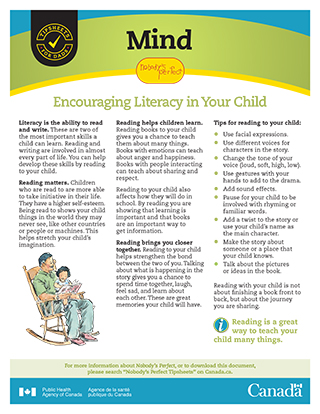Mind: Encouraging Literacy in Your Child

Download the alternative format (PDF format, 378 KB, 2 pages)
Organization: Public Health Agency of Canada
Literacy is the ability to read and write. These are two of the most important skills a child can learn. Reading and writing are involved in almost every part of life. You can help develop these skills by reading to your child.
Reading matters. Children who are read to are more able to take initiative in their life. They have a higher self-esteem. Being read to shows your child things in the world they may never see, like other countries or people or machines. This helps stretch your child’s imagination.
Reading helps children learn. Reading books to your child gives you a chance to teach them about many things. Books with emotions can teach about anger and happiness. Books with people interacting can teach about sharing and respect.
Reading to your child also affects how they will do in school. By reading you are showing that learning is important and that books are an important way to get information.
Reading brings you closer together. Reading to your child helps strengthen the bond between the two of you. Talking about what is happening in the story gives you a chance to spend time together, laugh, feel sad, and learn about each other. These are great memories your child will have.
Tips for reading to your child:
- Use facial expressions.
- Use different voices for characters in the story.
- Change the tone of your voice (loud, soft, high, low).
- Use gestures with your hands to add to the drama.
- Add sound effects.
- Pause for your child to be involved with rhyming or familiar words.
- Add a twist to the story or use your child’s name as the main character.
- Make the story about someone or a place that your child knows.
- Talk about the pictures or ideas in the book.
Reading with your child is not about finishing a book front to back, but about the journey you are sharing.
Reading is a great way to teach your child many things.
Fun & Easy Activities
Visit your local library for story time. Watch and listen to the storyteller for tips you can use the next time you read a story.
Make up songs using your child’s name. Play the “rhyme game” and use words that rhyme with your child’s name. Have your child make up a song using your first name or “Dad”.
Make your own story and draw pictures to illustrate the story. Making an alphabet book is a great start! This same activity can be used to make a comic book or sports magazine. Children love when they get to create their own characters in the story and use their creative skills!
Go on a short field trip with your child to a park or conservation area. Talk about what you see along the way. Seek and find the letters in your child’s name on park, traffic or store signs. When you get home ask your child to draw a picture of something you both saw during the trip and you can make a caption for the picture together.
Use magnetic letters on the fridge or even on a cookie sheet. Make words with the first letter in your child’s name. Your child can explore the letters and make words and you can even leave messages on the fridge for one another, such as, “I love you”.
Reading to Your Baby (0-12 months)
- Hold your baby comfortably – this helps your baby get used to reading as a time to be close to you.
- Follow your baby’s cues for “more” and “stop”.
- Point at pictures for your baby and say what you see. This helps your baby learn about things in the book.
- Rock your baby and sing lullabies, nursery rhymes, or other gentle songs.
- Use different types of books (board books, touch and feel, books with babies’ faces, and books that have different contrasts).
Reading to Your Toddler (1-3 years)
- Let your child control the book - hold it and turn the pages.
- Toddlers have a short attention span. Your child may want to not pay attention to the book you are reading for too long. That’s okay!
- Ask your child to point out animals, people, and objects. This helps your child learn about the things they see and hear in the story.
- Use books during routines, like waiting in lines, at bath time or bedtime. This can keep your child focused on the task and help pass the time.
- Be ready to read the same story over and over.
Reading to Your Preschooler
- Make reading together a routine at bedtime.
- Let your child tell the story by talking about pictures.
- Make the connection to what is happening in real life to what is happening in the story for your child.
- Ask open-ended questions - “what’s happening?”, “what do you think will happen next?”
- Read the same story over and over. Repetition helps children understand and learn more.
Adapted from “Dads Reading Toolbox”, Early Literacy Bookmark Series. Dad Central Ontario
The Public Health Agency of Canada gratefully acknowledges the collaboration and expertise of Dad Central Canada (www.dadcentral.ca) and their national network in the development of the Nobody’s Perfect tipsheets for dads.